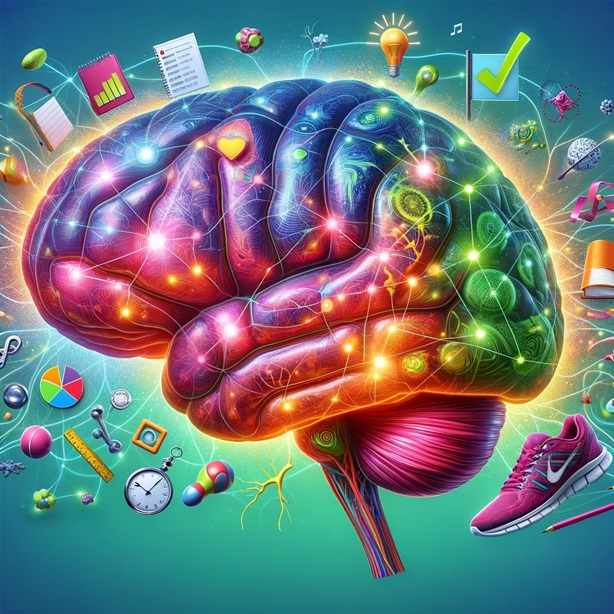Exploring Habit Formation in the Brain
Habits are the brain's way of automating routine tasks to save mental energy. But how are these habits formed in the brain? This article will explore the neural mechanisms that underpin habit formation, the central role of the basal ganglia, and the implications for cognitive health.
Understanding the neuroscience behind our habits is the first step towards harnessing this knowledge to improve our daily lives, whether it’s forming new habits that support our well-being or breaking those that don't. Habits are not just behavioral patterns; they also influence our cognitive functions and emotional states.
Habits emerge from the interaction between environmental cues, repeated behaviors, and the brain's reward system. As we delve into the science of habit formation, we'll uncover how these elements come together to shape our everyday actions.
The Role of the Basal Ganglia in Habit Formation
The basal ganglia, a group of nuclei in the brain deeply involved in coordinating movement, also play a pivotal role in the development and reinforcement of habits. These structures help encode patterns of behavior that are frequently repeated, eventually making them automatic. The more a behavior is repeated, the more entrenched the habit becomes, allowing the brain to focus on other tasks.
The basal ganglia are closely connected to the brain's reward system, which releases dopamine in response to pleasurable activities. This dopamine release reinforces the habit loop, consisting of a cue, a routine, and a reward. Through the process of neuroplasticity, in which the brain's neural pathways change and adapt, habits become the default mode of operation for certain activities, conserving cognitive resources for more complex tasks.
Understanding the role of the basal ganglia in habit formation highlights the brain's capacity for efficiency, which, while beneficial for routine behaviors, can also pose challenges when trying to break unwanted habits.
Strategies for Forming New Habits
Forming new habits isn’t just about willpower; it's about understanding how the brain works and leveraging that knowledge to your advantage. Start small and be consistent, allowing the basal ganglia to begin the process of habit formation. Pair new habits with existing ones to create strong associative links, and reward yourself to engage the brain's reward system, reinforcing the new habit.
Creating cues that trigger the desired behavior can help in establishing a new habit. For example, laying out workout clothes the night before can cue you to exercise in the morning. It’s also essential to create an environment that supports the new behavior and removes obstacles that may derail your efforts. Consistency is key – it’s the repeated, regular performance of a behavior that ingrains it as a habit.
Furthermore, visualizing the positive outcomes of the new habit can increase motivation. By engaging the brain's reward system through visualization, you can strengthen the new habit loop and make the behavior more appealing.
Breaking Unwanted Habits
Breaking habits can be challenging because the neural pathways associated with them are well-established in the brain. To break a habit, one must disrupt the automatic cycle that has been ingrained. Identify the cues and rewards that trigger the habit loop and replace the routine with an alternative action that provides a similar reward.
Mindfulness practices can increase awareness of the triggers and unconscious behaviors that drive habits, giving you the chance to alter them consciously. Additionally, reducing stress and improving sleep can weaken the hold of bad habits, as they often flourish under conditions of fatigue and anxiety. Developing alternative behaviors that serve the same purpose, such as going for a walk instead of smoking, can help to redirect the habit loop.
Support from social networks and accountability partners can also facilitate breaking unwanted habits. Engaging in positive social reinforcement and avoiding environments that trigger the old habit can increase the likelihood of success.
Improving Cognitive Health Through Habit Management
Good habits are the foundation of cognitive health. Habits such as regular exercise, a healthy diet, mental stimulation, and proper sleep can enhance brain function, improve memory, and reduce the risk of cognitive decline. Similarly, breaking harmful habits like smoking, excessive alcohol consumption, and sedentary behavior can significantly benefit cognitive health.
Recognizing the power of habits gives you the ability to shape your brain's functioning and health over time. By intentionally managing your habits, you're not just changing behaviors but also transforming the very structure of your brain to support a healthier, more vibrant cognitive life.
Healthy habits also have a compounding effect on cognitive health, as one positive behavior can lead to another. For example, regular exercise can improve sleep quality, which in turn enhances cognitive function and emotional regulation.
Conclusion: Harnessing the Power of Habits
The science of habit formation reveals that we have more control over our behaviors than we might think. By understanding the role of the basal ganglia and the habit loops that dictate much of our daily lives, we can implement strategies to form beneficial habits and break those that are detrimental.
The implications for cognitive health are profound, as habits shape not only our actions but also the structure and efficiency of our brains. Whether you're looking to improve your memory, increase productivity, or maintain cognitive function as you age, the key could lie in the mindful management of your habits.
By actively shaping your habits, you have the potential to enhance cognitive health and overall well-being, creating a foundation for a healthier, more fulfilling life.
